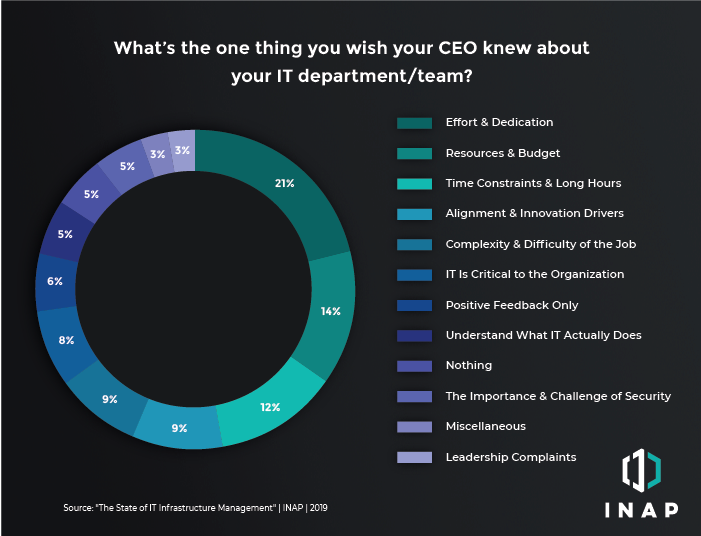
When was the last time your CEO personally called IT? If it’s ever happened, it was probably because something was very, very wrong.
But expectations have changed, and IT has become a valued strategic partner to the business. As IT becomes more aligned with other departments, it only makes sense for the C-suite to be more proactive about creating open channels of communication with IT.
In other words, maybe the CEO should be calling IT—and not just because something is on fire. That’s why we had the idea to get the conversation going. We commissioned a survey of 500 IT professionals with data center, server and cloud infrastructure responsibilities who work at businesses and enterprises with more than 100 employees in the United States and Canada.
We asked them, “What’s the one thing you wish your CEO knew about your IT department/team?”
Their answers ranged from straightforward and simple to humorous and even impassioned. In our analysis, several themes emerged. What follows is a rundown of those themes and what we think they say about IT, along with 60 of the most colorful, insightful and interesting responses.
But first, here’s the distribution of all 500 responses classified by their overarching message:

Effort & Dedication
I wish my CEO knew …
- “How dedicated the team is to making certain every aspect is attended to as if it is the only priority for the company.”
- “How much work we put in to keep problems at bay; they only acknowledge us when something goes wrong.”
- “We work harder than any other department, but we still get the least amount of recognition.”
By a wide margin, the largest share of responses expressed a desire to merely be appreciated and acknowledged for the effort and dedication they bring to their jobs. This sentiment was echoed and expounded on in many responses that fit into other themes as well.
It might be expected that professionals from virtually every function in any organization would express this. But for IT professionals, feeling underappreciated is simply one way in which they feel pressured by their job, as you’ll see.
Resources & Budget
- “The cost of keeping us in the top tier of digital transformation.”
- “How hard we work and how much training we actually need to keep up to date with everything.”
- “How much of everything we accomplish is in the face of limited staff, education and resources.”
No surprises here: Many IT pros feel squeezed by a lack of resources, whether budget, training, headcount or all of the above. As the role of IT has expanded far beyond tech support and merely maintaining systems, it’s clear that IT pros don’t feel the amount of resources they are given has kept up with the growing scope of their responsibilities.
This issue is compounded by the fast pace of technological advancement and the continuous need for education and additional staff to properly leverage new technology.
And lurking beneath the call for greater resources is also the negative impact that staffing shortages have on the department as a whole.
- “How the lack of funding and consequential shortage of personnel affects the existing staff.”
- “Too many responsibilities to manage and monitor for a small IT staff. We get overwhelmed when everything goes wrong at the same time.”
As we covered in a recent blog on IT’s time, the question of morale—and its effect on effectiveness and efficiency in the IT department—is not one to be ignored, especially as the importance of IT’s role to the rest of the business continues to grow.
Alignment & Innovation Drivers
- “I wish the CEO knew exactly how many different areas that the IT department has some involvement in. From sales to marketing to human resources to finance, there is almost nothing that happens in the company that the IT department did not have a hand in.”
- “That we do more than manage and upkeep. We would like more projects that involve scaling the business—we can help with more than just maintenance of systems.”
- “By working together, we can align IT tech with business strategies to achieve goals faster.”
Organizations are looking to IT to lead digital transformation, and IT is stepping up to the challenge. This can only increase the value that IT brings to the business’s bottom line. Yet with this leveling up of the function’s strategic importance come the growing pains of shedding old notions about IT’s role in the business.
- “We do more than just fix computers.”
It’s old hat at this point to think of the IT role as primarily the help desk or computer troubleshooting, and it’s becoming clear that even the routine maintenance and monitoring of infrastructure is not where IT can deliver the most value to the business.
Instead, IT pros can and want to be more involved in managing digital transformation across the enterprise, in addition to turning the department into a true center of innovation.
- “Our true value to innovation, not just housekeeping.”
- “We are also an innovation center.”
IT Is Critical to the Organization
- “Know that in this day and age, the business would fail without our IT department keeping up with the latest technology.”
- “That we keep most of the business running. Without us, everything would be chaos.”
- “The overall importance to the entire organization and value we provide on a daily basis.”
- “Without us, you’re ****ed.”
Even as IT professionals want to be recognized for the value they bring to digital transformation and innovation, many also expressed a desire to be appreciated for the basic technological functionality that they ensure for the rest of the organization. The routine, the mundane, the day-to-day: Whatever you want to call it, it’s integral to the entire organization’s ability to function, yet many IT pros don’t feel that it’s treated as such.
On top of that, there is the sense that the important work goes on outside the visibility of the rest of the business, and thus unnoticed.
- “We work a lot behind the scenes to make sure that things work smoothly for all in the organization.”
- “How much effort goes into running and delivering quality IT solutions for multiple departments on a constant basis. My team works extremely hard to ensure the rest of the company can flow properly.”
Understand What IT Actually Does
- “I wish that they would spend some time shadowing us so they can experience everything we do and go through.”
- “That our day-to-day operations are a great deal more fluid than he thinks and that sometimes, deadlines just simply can’t be met due to unexpected issues.”
- “I wish the CEO knew about how many different responsibilities our department actually has and took the time to learn about what we actually do most of the time to see that it isn’t just about working with computers or servers.”
There is a lot to unpack here, but it all boils down to one thing: many IT professionals are frustrated that their CEOs seemingly just don’t get it. And when the CEO doesn’t know exactly what you do—or you’re not sure that they do (we’re not sure which is worse)—then you’re going to run into a host of problems.
One of these problems is unrealistic expectations, as explained in the quote above. And when your CEO doesn’t know the scope of what you’re doing, they won’t understand why you can’t do some things.
- “I wish the CEO knew how much we have to deal with during our day at work. It’s not just making sure that everything is working in the system and up and running; there are other little small things that keep us busy.”
- “How much we actually do each day.”
Likewise, another respondent pointed out how IT isn’t a “traditional” kind of job.
- “How IT doesn’t fit in to a cookie-cutter 8-5 job description.”
But many responses also just boiled down to a desire for their CEOs to understand and recognize the daily challenges of the job.
- “We do a lot more than we are given credit for.”
- “What we deal with.”
- “The day-to-day technical headaches we solve.”
Time Constraints & Long Hours
- “I wish my CEO knew that my IT department feels a little overloaded with too much work and not enough time to get any meaningful innovative work completed.”
- “How much extra time and effort we put in. We are working hard even when there aren’t any critical incidents or alerts.”
- “I wish my CEO was more aware of the actual time and effort that goes into running IT for our organization. Many employees put in long work hours, sometimes forgoing their own personal time to help the organization.”
As we covered recently, IT professionals are extremely conscious about the time they spend at work and what they do with it. As illustrated by some of the responses to this question, many wish their CEO knew about the amount of after-hours work they have to put in. Others are frustrated with the work getting in the way of value-added, innovative work.
Still others would like to have a healthier balance between work and their life outside of it. In our survey, we found that the No. 1 thing IT pros would do if given back 16 hours in their week is “reclaim work-life balance.” Given these responses, that’s probably no surprise, and the dangers of burnout are real, so this should be worrying.
- “How much extra work (pager/after-hours support, arriving early, staying late, etc.) that the IT department puts in on quite a regular basis.”
- “Our team works too many hours, and our work-life balance is really bad.”
The Importance & Challenge of Security
- “The challenge of staying ahead of cybersecurity threats.”
- “I wish the CEO understood the importance of security and IT’s role in that. As things are, we are just putting band-aids on servers to keep them running.”
- “[We are] keeping the organization’s applications and data safe, secure and available 24/7.”
Security is and will continue to be top-of-mind for IT professionals. Yet while the downsides of unsecured IT infrastructure and potential data breaches are well-known, many respondents don’t believe that their CEO is appropriately informed on either the importance of security nor how it is maintained.
Some responses pointed out the difficulty of assuring infrastructure security and the need for more resources.
- “How much time, energy and especially money it takes to run a secure infrastructure.”
Others highlighted the constant vigilance and effort required to stay ahead of information security threats.
- “The dedication that is put forth to keep the company up and running securely.”
- “How hard we work to keep the company’s data secure and our operation running smoothly.”
Still, others merely wished their CEO stayed current on the extent to which security is crucial to the business as a whole, especially in light of how relentlessly security threats appear and evolve.
- “How much security is needed [to protect] our information.”
- “The burgeoning threats with security concerns and infrastructure.”
Complexity & Difficulty of the Job
- “How hard and challenging my daily [job] is. I am human and can only do what is in my capacity.”
- “How our job is goes extreme relaxation to extreme stress in a minute when everything goes wrong at same time.”
- “How close we are at times to totally losing it.”
Many of the responses in this category partially relate to a desire for recognition for how stressful, complex and harrying IT jobs can be, as exemplified in the quotes above. Special emphasis was placed on how quickly a day can go from “normal” to crisis mode or the constant stress of maintaining the critical systems that the whole organization relies on.
Yet one of the most interesting takeaways is the extent to which many IT professionals see their roles as uniquely challenging. Given the rapid clip at which technology is developed and released, it’s no wonder that IT pros feel caught between mastering their current skill set while also keeping ahead of trends by picking up new ones.
- “I wish they understood how many different skills people in IT are supposed to master compared to basically everybody else at the company.”
- “All the different skills and knowledge [required] just for us to do our job and how quickly tech evolves.”
And this is something they believe is innate to the IT function and thus not properly appreciated by the rest of the business, including the CEO. But overall, the message still remains the same: IT pros want to be valued and appreciated for the effort they put in just to be competent at their roles.
Positive Feedback Only
- “We have a great CEO who is hands-on and involved with everything we are working on.”
- “The CEO knows exactly everything about our IT department. We have monthly meeting with board members and we have a very open-door policy.”
- “We have a great CEO that understands what we do and our value to the company.”
Encouragingly, there were a good amount of responses that showed a strong level of alignment and involvement between the CEO and the IT function. Most of these emphasized strong communication and a deep feeling of mutual understanding when it came to the value of IT, organizational priorities and goals, and operations. Nearly all of these responses referenced a regular cadence of communication, whether weekly or monthly meetings, formal or informal. Some made note of the CEO’s IT background, indicating that a demonstrated knowledge of IT’s technical role can make a big difference in ensuring alignment.
Leadership Complaints
- “I wish that the CEO had the technical knowledge to better understand both the limitations of technological products [and] the possibilities that these products bring to the business.”
- “Make himself more visible, present in our department.”
- “How our abilities are underutilized due to leadership’s lack of forward thinking.”
- “If he came in daily, that would be good.”
Though a tiny sliver of the responses, several IT pros identified specific leadership complaints about their CEO. They correspond to much of the positive feedback other respondents had. Specific complaints include a lack of technical knowledge, infrequent or poor communication and alignment, and a lack of vision for IT.
Miscellaneous
A handful of responses were very specific or didn’t otherwise fit into a broader category. Here is a sample:
- “We need more freedom.”
- “The organizational structure is not reflective of talent and abilities.”
- “We aren’t all geeks.”
- “Trust our experience and knowledge.”
- “Data quality issues we have that aren’t prioritized seriously.”
- “[Our] mission for the future.”
Nothing
- “Nothing.”
Some respondents simply said that there was nothing they wish their CEO knew … or maybe they were just eager to get back to work.
Seeking insights for success? Explore HorizonIQ’s strategies for businesses like yours.













